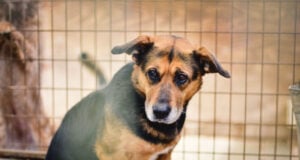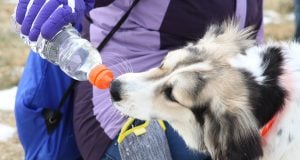Depending on the breed, when your dog is seven years or older, he may be considered a senior.
With old age comes various issues that can negatively affect your dog's health.
Unplanned weight gain in senior dogs is one of the more common issues.
As your old dog becomes more overweight, this can lead to many other related health problems.
Studies show how senior dogs will experience a decreased metabolic rate, reduced immune capability, and signs of arthritis.
They become less active and subsequently become more susceptible to infection.
They have a reduced capability to regulate body heat (thermoregulation), and their organ systems will undergo profound changes.
One of the leading causes of health problems in senior dogs is excessive weight gain.
It is a normal aging process but can also be caused by underlying issues.
It is up to you to take your pet for regular check-ups at the veterinarian to rule out any of the diseases that plague older dogs.
But you can still help your old dog maintain a healthy weight with a regular regime of exercise and an appropriate senior dog diet.
It's been proven that obesity puts severe strain on your dog's body and will contribute to bone and joint problems like arthritis and hip dysplasia.
Senior obese dogs are also more prone to skin and urinary tract problems.
There are quite a few other diseases that are caused by being overweight.
Thus you need to address this problem immediately and keep an eye on your dog's weight to prevent other illnesses.
ASK A VET: How to Put an Overweight Dog on a Diet?
Weight Loss Basics for Senior Dogs
The main reason for weight gain in senior dogs is their level of activity decreases.
Joint problems and general muscle weakness may cause them to avoid exercise.
If this happens to your dog, it's time to look at your pet's nutrition plan to increase his quality of life and prolong his lifespan.
Before making any dietary adjustments and switching to senior dog food recipes, take the dog to the vet to test for any age-related illnesses.
Keep an Eye Out for Hypothyroidism
If your dog suddenly gains weight despite eating the same amount as before, or if your dog's appetite decreases but still gains weight, it could be an underactive thyroid.
You may also notice your pet being lethargic with a dull coat.
A complete thyroid panel is needed to identify hypothyroidism in dogs.
Your vet will put your dog on thyroid supplementation and ask you to bring him in for periodic re-testing.
If all goes well, he should slim down and get back some of his energy, keeping in mind that senior dogs aren't as active as when they were younger.
If your dog's underactive thyroid is left untreated, it can significantly decrease its quality of life.
The thyroid gland regulates the metabolism of all cellular functions.
If not managed, hypothyroidism will progress over months and years, eventually resulting in end-stage disease.
Beat the Bulge
Before we look at ways to beat the bulge, it is time to get real. Dogs are fatter than ever.
It's estimated that 53% of all dogs in the US are overweight or obese.
That's more than 40 million dogs.
There are so many overweight dogs in the world that when we see a dog that is at a healthy weight, we immediately think she is too skinny and unhealthy.
Ask your vet about your dog's weight if you're unsure.
But it's easy to learn how to assess a healthy weight in dogs.
If you can't easily feel your dog's ribs and shoulder blades, if she has no waist or if there's a roll of fat at the base of her tail, it is time to face reality and start your dog on a diet.
Studies show that objectively assessing your dog's weight means increased lifespan.
7 Ways to Slim Down Your Senior Dog
Here are 7 ways to slim your senior dog down if you're in the dark about where to start.
Count those calories
Every weight-loss plan is based on a straightforward principle: calorie intake vs. calorie output.
To lose weight, a dog must consume fewer calories than they burn a day.
Start by counting your dog's calories accurately.
Instead of feeding ‘free-choice' or giving your dog one or two meals a day, change to feeding your dog several small meals a day.
That way, you'll be able to control and monitor how much they eat.
Reduce portion sizes
Building on the above point, reduce your dog's food meal portion size.
Weigh your dog the day you start and again in two weeks.
If she has yet to lose weight, reduce the food.
You can continue gradually reducing her food until you see a difference on the scale, then continue feeding that amount.
Slow and steady changes to your dog's diet are more likely to result in long-term success.
Reducing the amount of food your dog eats per day too drastically might slow your dog's metabolism, making it more difficult to lose weight.
Increase protein intake
Feed more protein and fewer carbohydrates.
Your dog generally needs minimal carbohydrates, most of which should be high in fiber.
The best diet for any dog, especially senior dogs, is one high in protein, low in carbs and moderate in fat.
The protein and fats will also make your dog feel more satiated and energetic.
Replace carbs with fats
Feed fats to beat the fat.
As you decrease the number of carbs, you can add a little more fat to the dog's diet.
Dietary fat is not adipose tissue fat; it does not make your dog (or you) gain extra layers of body fat.
However, remember that fat is higher in calories than carbs or protein, so only a tiny increase (if any) should be considered.
Omega-3 fatty acids EPA and DHA from fish itself or fish oil supplements promote weight loss and will make your dog feel more satisfied. Omega-3s are also healthy for dogs in many other ways and particularly important for seniors.
Switch to different treats
Change the treats you give.
We dog owners can't go without rewarding our pets with a treat or two.
But it's essential to look at how many treats and what kind of treats you give your dog as they can quickly add up to a lot of calories.
Consider giving your pooch healthy dog treats or low-calorie smaller treats, especially if you reward your dog during training on a regular basis.
You can also find better alternatives for any natural treats.
For example, choose leaner meat instead of fatty pork or beef meat.
Make sure the meat is lower in fat and calories, such as turkey.
You can also use low-fat organ meats like heart or liver.
Your dog is sure to lick its chops for those healthy niblets.
Finally, if the treats are getting in the way of your dog's weight loss, use some of your dog's daily food as a treat.
Consider a homemade diet
If you want to know what and how much your dog is eating, consider feeding her homemade dog food.
If you consult with a vet and educate yourself on appropriate ways to do this, you have a good chance your overweight senior dog will slim down.
Use lean meats, low-fat dairy, and vegetables in your dog's diet.
Mixing your dog's food at home means you can also cut out grains and starches from his diet to make losing weight easier.
Lamb, pork, and other fatty meats should be avoided or fed on rare occasions.
Focus on feeding enough protein and healthy fats to satisfy your dog and prevent protein deficiency that would otherwise cause muscle loss.
Replacing a large portion of his diet with vegetables because you think it will make him feel satiated is unwise.
Just adding bulk is not enough.
Keep your senior dog moving
Exercise is essential no matter the dog's age.
It might be difficult for your dog to get up and go for a walk if he is overweight and suffering from joint pains due to extra weight, but every little bit counts.
Even if you play fetch for a few minutes, it will positively affect your dog's journey to weight loss.
Maintenance Stage
After the pounds have melted off, you cannot return to the old diet as the weight will return.
Continue monitoring your dog's weight on a bi-weekly basis.
You may need to adjust after the ideal weight has been reached.
Consult with your vet for the maintenance diet for your senior pet, and be sure to weigh the food you give per day to make tweaking amounts easier in case of future weight gain.
How To Help A Senior Dog Lose Weight: Summary
Now we've given you some great tips on how to help your senior dog lose weight.
Senior dog weight loss is crucial for their quality of life if you have noticed some of the signs that they are overweight.
When they are heavier the pressure on the joints is a huge difference.
Imagine if you or I am in our 60s-80s and we are 50 lbs overweight. I'm just giving an example, but let's say your dog is 20 lbs. Your dog's ideal weight is about 12-13lbs.
And you have successfully completed a phase where you gave them the best diet for old dogs and followed the regiment we went through.
Now your dog is 12 lbs. So they lost 8 lbs. 8 lbs of 20 lbs is 40% of their body weight.
Okay, now to give you a human weight so you can compare.
Let's say I am 6′ tall and weigh close to 300 lbs. bc to me at my size that is overweight.
40% of my body weight or 120lbs. If I lost 120lbs, I would be probably feel amazing.
At 180 lbs I would feel lighter and more comfortable with my weight.
I could run and jump much faster and higher and runlonger distances because I lost all that weight.
That's the difference and why keeping your senior dog's weight at a normal range is so important.
Let us know in the comments what you all think or if you have a personal story to share!
READ NEXT: The Best Weight Loss Dog Food for Fat Dogs
Want to share this?















